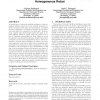11 search results - page 2 / 3 » The Evolution of Reaction-Diffusion Controllers for Minimall... |
GECCO
2009
Springer
13 years 12 months ago
2009
Springer
Embodied cognition emphasizes that intelligent behavior results from the coupled dynamics between an agent’s body, brain and environment. In response to this, several projects h...
ATAL
2008
Springer
13 years 7 months ago
2008
Springer
Animal ecologists have successfully applied agent-based models to many different problems. Often, these focus on issues concerning collective behaviors, environmental interactions...
GECCO
2009
Springer
13 years 12 months ago
2009
Springer
A central tenet of embodied artificial intelligence is that intelligent behavior arises out of the coupled dynamics between an agent’s body, brain and environment. It follows t...
ALIFE
2010
13 years 4 months ago
2010
Embodied artificial intelligence argues that the body and brain play equally important roles in the generation of adaptive behavior. An increasingly common approach therefore is to...
ECAL
2007
Springer
13 years 11 months ago
2007
Springer
Real organisms live in a world full of uncertain situations and have evolved cognitive mechanisms to cope with problems based on actions and perceptions which are not always reliab...

